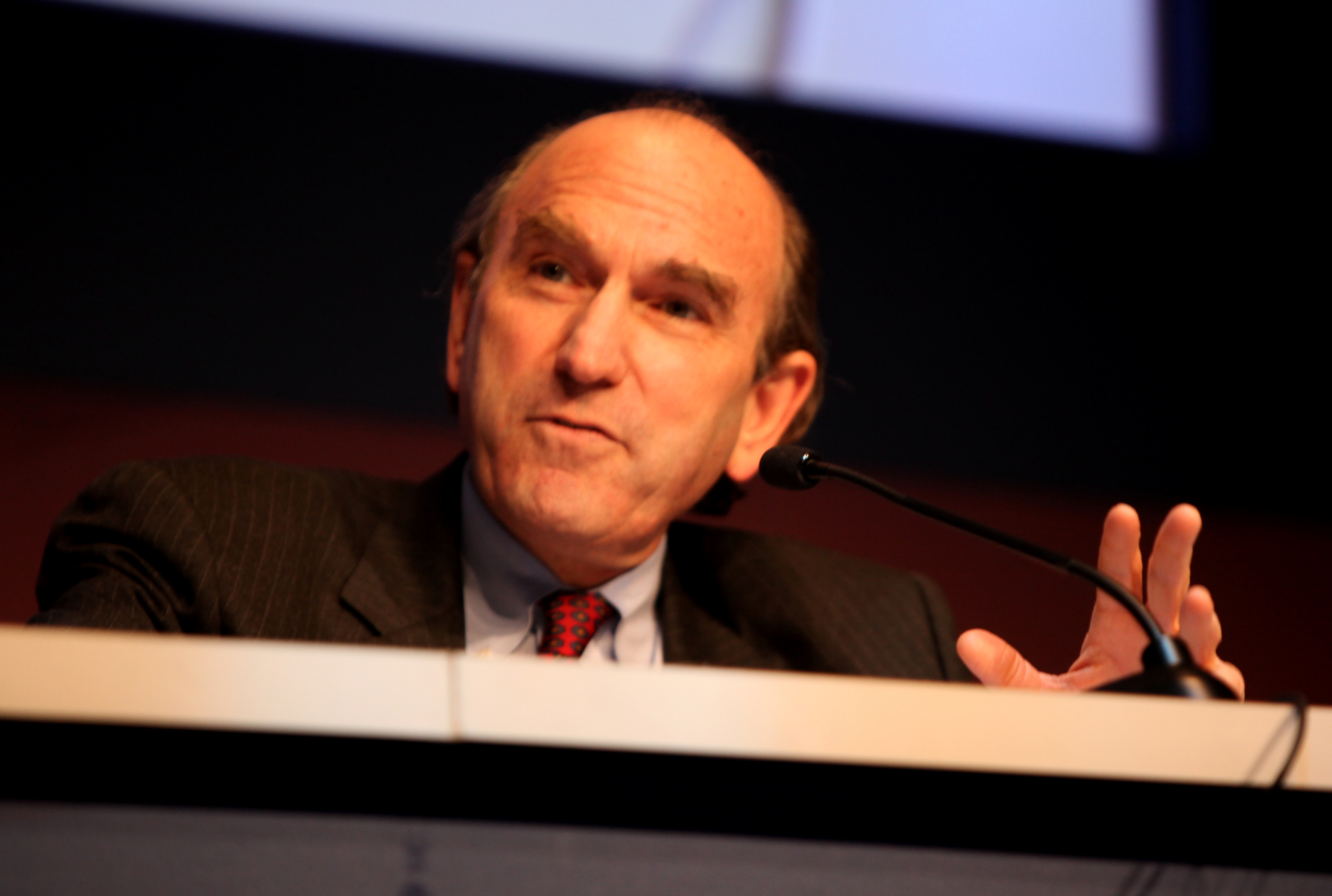 Wearing a red tie, Elliott Abrams, the renowned American diplomat who served under Presidents Ronald Reagan and George W. Bush — most recently as Deputy National Security Advisor for Global Democracy Strategy — could be seen talking with a friend in the quiet halls of the UCLA School of Law. As the gentle murmurs of the thirty or so guests of the Burkle Center’s event could be heard in the hall, a few notable voices and conversations rose to the top: “Hi, Elliott, how are you,” a gentleman’s voice rang out, “we’ve met many times, back when I was with Rumsfeld…”A small, familiar circle formed around him before the doors opened and, as law students filed out, the room slowly filled.
Wearing a red tie, Elliott Abrams, the renowned American diplomat who served under Presidents Ronald Reagan and George W. Bush — most recently as Deputy National Security Advisor for Global Democracy Strategy — could be seen talking with a friend in the quiet halls of the UCLA School of Law. As the gentle murmurs of the thirty or so guests of the Burkle Center’s event could be heard in the hall, a few notable voices and conversations rose to the top: “Hi, Elliott, how are you,” a gentleman’s voice rang out, “we’ve met many times, back when I was with Rumsfeld…”A small, familiar circle formed around him before the doors opened and, as law students filed out, the room slowly filled.
Abrams began his half-hour speech about recent efforts for peace in the Middle East with a piece of advice President Bill Clinton had passed on to President-Elect George W. Bush: “Don’t ever trust [Palestinian National Authority President Yasser] Arafat…he’s a liar and he will lie to you as he lied to me.” He continued with a question often asked by opponents of President Bush: What did the Bush administration ever do for the Middle East peace process, specifically between Israel and the Arab nations? It reduced the violence in the region, Abrams explained. In January of 2001, “Camp David had collapsed into an Intifada” (the second of two waves of “Palestinian”-Arab terror attacks that ultimately killed 1,200 Israelis, mostly civilians, and 64 foreigners). The Bush administration was primarily concerned with, as Israel was, at least “getting the level of violence down,” to create calm in the volatile region. There was no talk of the peace process, and the idea that the Bush Administration “did nothing for 6 years” was ridiculous when considering the violent times.
The previous “solution” to the Arab-Israeli conflict, supported by the Reagan administration’s George Shultz, was that “Gaza goes back to Egypt and the West Bank [Judea and Samaria] to Jordan.” When the idea of a “Palestinian state” was first proposed, President Bush saw the problem inherent in such a scenario: another repressive Arab state was dangerous. If there were to be any future with a “Palestinian state,” it would have to be a peaceful, democratic state. Therefore, by definition, it would have to be without Arafat, the foreign leader who had made the most number of visits to Clinton’s White House (13 visits). Arafat was replaced as President of the Palestinian Authority by Mahmoud Abbas in 2003. In 2005, Abbas promised Israel’s then-Prime Minister Ariel Sharon that he would stop the violence, peace talks resumed later that year, and in July, Abbas was allowed to come to the White House. Again, says Abrams, in the midst of all these negotiations and meetings, Israel’s (and the Bush Administration’s) main goal was to reduce violence (in the case of the Sharm el-Sheikh Summit, to attempt to convince Abbas to end the four-year Second Intifada). Sharon, by starting the building of the security barrier, was creating borders — knowing that Gaza had an indefensible Jewish minority — with no panacea “peace process” solution in mind.
In Jan. 2006, the terrorist organization Hamas won elections in Gaza. The Second Lebanon War erupted that summer, a war which, Abrams said, was “a war of choice” — Israeli Prime Minister Ehud Olmert “could have chosen 3 days of bombing,” but opted for a war instead. His goal was to “decimate Hezbollah,” which he failed to do. According to Abrams, Olmert and Abbas were both too weak to deliver any terms of a peace process.
However, in 2008, Olmert did make a peace proposal, which Abbas refused to sign. Jacob Walles, the U.S. Consul General in Jerusalem, said at the time that “Abbas did not sign because he will never sign anything,” due to pressure from Hamas, for fear of being scorned as a “traitor” to the Palestinian cause, and the unwillingness of many Arab countries to work towards peace with Israel — instead preferring to wipe Israel off the map.
Abrams concluded his lecture with three important lessons: Firstly, that “peace comes from the ground up, not the top down” — that peace negotiations and governments should immediately concentrate on practical, positive effects in the West Bank, like allowing Arabs to come work in Israel and Israelis to shop in Judea and Samaria, rather than struggle with larger and more idealistic solutions. Secondly, that “you get more out of the Israelis by hugging them than distancing them—when you hug them, you can squeeze them a little”; something that, according to Abrams, the Obama administration is beginning to find out. His final message: “The Arab-Israeli conflict is not the biggest problem in the Middle East—Kerry is wrong. There’s Syria, Libya, and Egypt…”
He ended with an anecdote: a few years ago, when meeting with a wide range of diplomats from Arab countries, he let them speak for sixty minutes, and when the hour ran out, he stopped the diplomats. “It has been an hour,” said Abrams pointedly, “and have you noticed that you have not mentioned Israel once?”

